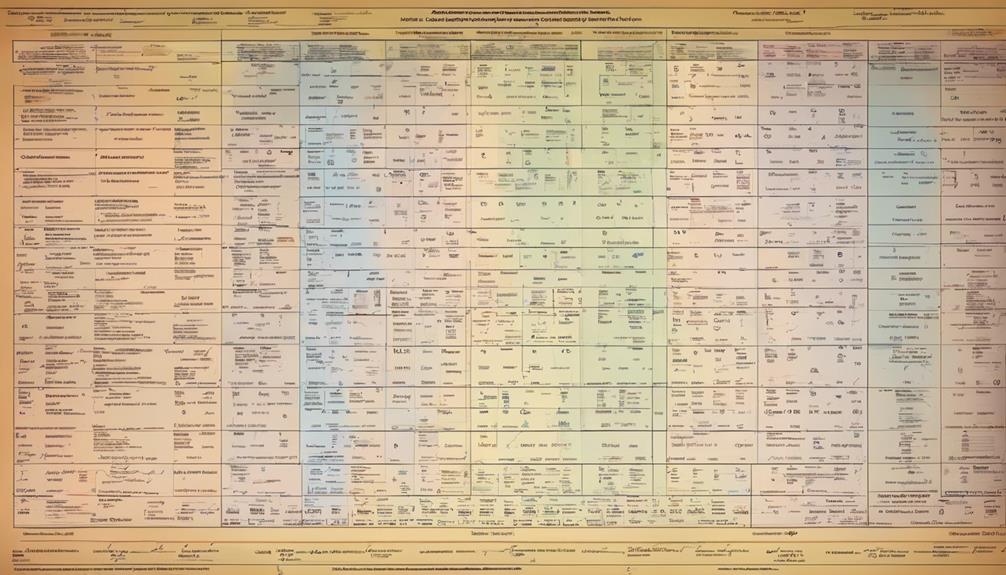Navigating the complex realm of cognitive disorders, comprehending Unspecified Dementia ICD-10 can seem like solving a perplexing puzzle that is essential for patient care.
The classification of dementia under code F03 serves as a critical cornerstone in the diagnostic process, shedding light on cases where clarity is elusive.
As we delve into the nuances of this classification, we uncover the nuanced interplay between diagnostic accuracy, treatment strategies, and healthcare management for individuals grappling with cognitive decline.
Key Takeaways
- ICD-10 code F03 aids in managing suggestive symptoms effectively.
- Proper tracking enables resource allocation and trend analysis.
- Enhances care through effective management of behavioral disturbances.
- Vital for accurately identifying unidentified dementia cases for optimal care.
Importance of Unspecified Dementia ICD-10
In our clinical practice, understanding the importance of utilizing the Unspecified Dementia ICD-10 code F03 lies in its crucial role in accurately capturing instances where the specific etiology or type of dementia remains unidentified. Alzheimer's disease, a common form of dementia, presents challenges in diagnosis, especially in its early stages when symptoms may not clearly point to a specific type.
By using the F03 code, we can ensure that patients with symptoms suggestive of dementia but without a definitive diagnosis are still accounted for in healthcare data. This coding specificity is vital for tracking trends, allocating resources, and conducting research on dementia prevalence and outcomes.
Furthermore, coding unspecified dementia accurately allows healthcare providers to address associated behavioral, psychotic, or anxiety disturbances effectively, as these symptoms can significantly impact a patient's quality of life. Thorough documentation by clinicians supports the use of the F03 code and enhances the overall care provided to individuals experiencing cognitive decline.
Key Features of the ICD-10 Code

Utilizing the ICD-10 code F03 for unspecified dementia involves capturing cases where the specific etiology or type remains unidentified. This code, F03, is designed to classify cases of dementia without specified severity or behavioral, psychotic, or anxiety disturbances. It's crucial to apply this code when the underlying cause or type of dementia isn't clearly documented in the medical records.
By using F03, healthcare professionals ensure accurate classification and billing for patient care related to unspecified dementia cases. Importantly, the F03 code excludes senility NOS (R41.81) and serves as a placeholder when a more specific code for dementia is unavailable.
Understanding the key features of the ICD-10 code F03 is paramount for coding and documenting instances of unspecified dementia in healthcare settings, facilitating proper record-keeping and continuity of care for individuals with this condition.
Diagnostic Criteria and Guidelines
Diagnostic criteria and guidelines for unspecified dementia under the ICD-10 code F03 require a comprehensive understanding of the condition's presentation and documentation requirements. When coding for unspecified dementia, healthcare professionals should keep in mind the following:
- Code F03: This code is used for unspecified dementia without specified severity, behavioral, psychotic, or anxiety disturbances. It excludes senility NOS (R41.81) and is employed when the type or cause of dementia is unknown.
- Behavioral or Psychotic Disturbances: In cases where patients with unspecified dementia present with behavioral or psychotic disturbances, it may be appropriate to use codes F03.91 or F03.92 to capture these additional symptoms.
- Accuracy in Coding: Accurate coding for unspecified dementia is paramount for proper documentation and billing purposes. Understanding the nuances of the diagnostic criteria and guidelines is essential to ensure that the coding accurately reflects the patient's condition, leading to appropriate reimbursement and quality of care provision.
Coding and Documentation Tips

Implementing appropriate coding and documentation practices is crucial in accurately capturing and reflecting the nuances of unspecified dementia in healthcare records. When documenting unspecified dementia in ICD-10, it is essential to use the code F03 without specifying severity or behavioral disturbances. Additional codes should be included if there are associated behavioral or psychotic disturbances in patients with unspecified dementia. Avoid using code F03.90 for unspecified dementia with behavioral disturbances, as it is specifically for cases without these disturbances. Always ensure accurate documentation and coding to reflect the specific condition and severity of unspecified dementia in patients. Regularly reviewing and updating documentation is key to capturing any changes in the patient's condition or dementia symptoms for precise coding.
| Tips for Coding and Documentation |
|---|
| Use code F03 for unspecified dementia |
| Include additional codes for associated behavioral disturbances |
| Avoid using code F03.90 for dementia with behavioral disturbances |
Impact on Patient Care
Proper documentation and accurate ICD-10 coding for unspecified dementia play a crucial role in enhancing patient care by facilitating precise tracking and treatment planning for this cognitive condition.
Impact on Patient Care:
- Enhanced Treatment Planning: Identifying unspecified dementia through ICD-10 coding allows for tailored treatment plans that address the specific needs of patients with cognitive impairment.
- Improved Communication: Accurate coding ensures seamless information exchange among healthcare providers, leading to better coordination of care and more effective interventions.
- Research Advancements: Utilizing precise ICD-10 codes for unspecified dementia contributes to the development of insights into the condition, enabling advancements in care practices and outcomes assessment.
Frequently Asked Questions
What Is the ICD-10 Code for F02 80?
F02.80 is the ICD-10 code for unspecified dementia without specific behavioral, psychotic, or anxiety disturbances. This code is utilized when detailed information isn't available to assign a more precise diagnosis.
It's crucial to accurately document dementia symptoms to ensure correct coding and billing. Healthcare providers should aim to gather thorough information for a more accurate diagnosis, avoiding unspecified codes like F02.80 whenever possible.
What Is the New ICD-10 Code for Dementia?
We've got the scoop! The new ICD-10 code for dementia is F03. It falls under unspecified dementia without specific behavioral or psychotic disturbances category.
This code is the go-to when the severity of the dementia is unspecified. Remember, F03 excludes senility NOS (R41.81).
Ensuring accurate coding with F03 is crucial for proper diagnosis and billing for patients with unspecified dementia.
What Is the ICD-10 Code for F03 92?
We use the ICD-10 code F03.92 to classify unspecified dementia cases with behavioral disturbance, excluding psychotic and anxiety-related symptoms.
Accurate coding like F03.92 is crucial for documentation and billing in healthcare. Understanding these nuances empowers healthcare providers to effectively manage patients with unspecified dementia.
Proper ICD-10 coding ensures precise communication and appropriate care for individuals with this condition.
What Is the ICD-10 Criteria for Dementia?
When diagnosing dementia, healthcare providers consider severity, behavioral, psychotic, and anxiety symptoms. Accurate documentation and coding, like using ICD-10 criteria, are crucial for effective treatment.
The ICD-10 code F03 doesn't specify these additional details, so careful assessment is vital. Understanding these criteria helps in managing cognitive impairments and providing proper care.
It's essential for healthcare professionals to stay informed and utilize these guidelines for the benefit of patients.
Conclusion
In conclusion, the utilization of the unspecified dementia ICD-10 code F03 is crucial in accurately classifying cases of dementia with unknown etiology. By following diagnostic criteria and guidelines, healthcare providers can ensure proper coding and documentation to support patient care.
Remember, in the world of dementia diagnoses, 'knowledge is power' – so let's continue to prioritize precise coding practices for the benefit of those affected by cognitive disorders.








